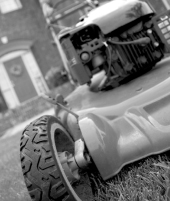
Today, it’s trendy to denounce consumerism and individualism. But do we know what they are? Consume This! looks for a new way to be Anabaptist in the 21st century by highlighting habits taken for granted. How are thought, faith, and action connected?—Eds.
I can’t mow my lawn right now. Not because I’m physically unable to do so and not because I don’t need to. I can’t mow my lawn right now because I don’t own a lawnmower. There’s one close by, but I can’t get to it right now because it’s in my neighbour’s garage.
 This seemingly odd scenario has become, for me, a statement of values and theological reflection on the nature of convenience, community, and consumption in our modern culture. Does this statement seem a little heavy for a summer reflection? Then allow me to explain the story of our neighbourhood lawnmower.
This seemingly odd scenario has become, for me, a statement of values and theological reflection on the nature of convenience, community, and consumption in our modern culture. Does this statement seem a little heavy for a summer reflection? Then allow me to explain the story of our neighbourhood lawnmower.
A community lawnmower
Three years ago, our family relocated from a townhouse complex into a detached single family home. We planned every aspect of our move very carefully. Except, we somehow overlooked the fact that we now owned a lawn – which meant we needed to own a lawnmower. Or did it?
As we engaged our new neighbours in dialogue and processed life together in our subdivision, we began to explore the idea that since each yard was very small, and each family was interested in developing ongoing connections, we might not actually each need to rush out and buy a $350 Briggs and Stratton.
In fact, as the dialogue progressed, we decided to do something radical – to do for lawn mowing what HOV lanes have done for carpools and what libraries have done for book-lovers: to reduce individual consumption by increasing interdependence and community. So, the people who live next door to us bought one electric lawnmower and one trimmer, which we now share between three houses.
The upside of this experiment has been a wonderful sense of neighbourly interdependence. Care for another’s well-being and a passionate desire to share what we have with those around us go hand in hand.
Lessons learned
That’s just what the early church thought and taught. In Acts 2:44, one of the early defining marks of their experience is noted: “All the believers were together and had everything in common.” The other upside in Acts 2 is the evangelistic fruit born out of the experience of authentic community.
The downside of this kind of radical sharing is that you put yourself at the mercy of other people. In my situation, it means I can’t always cut the lawn precisely when it’s most convenient for me to do so – which would be right now!
But the benefit of inconvenience is that it teaches a person how to serve. Our other neighbours are getting older and it’s difficult for them to mow their own lawn. Since they don’t own a lawnmower either, it creates a situation of neighbourly need where the door is open for someone to step into their lives and serve them. When we choose to do so, we have a chance to demonstrate in a tangible way the grace of our generous God.
Embracing inconvenience
Perhaps that’s why this idea isn’t practiced much in our churches or communities today. Because the choice to embrace community and to serve is almost always a choice to accept a certain level of inconvenience. If everyone has their own lawn, then everyone, it seems, has a right to have a lawnmower. In the face of unbridled lawnmower purchasing, what’s a person to do?
This summer, perhaps we could each choose two simple and practical ways to release ourselves from the grip of consumption by deliberately inconveniencing ourselves. For example, we could choose to see the evening meal not as a convenience item for quick consumption, but as one of God’s many gifts and meeting places to be stewarded well. We could choose to share or give away our second car to a ministry or family in need instead of trading it in for a newer model. We could choose to take a student or new immigrant into our home, not for the profit margins but as a ministry.
A little inconvenience can go a long way, not only in reducing our consumptive footprint but also in developing a truly interdependent and spiritually mature community.
Not owning a lawnmower may not be the most convenient way to live, but it certainly teaches me that we really do need each other after all.